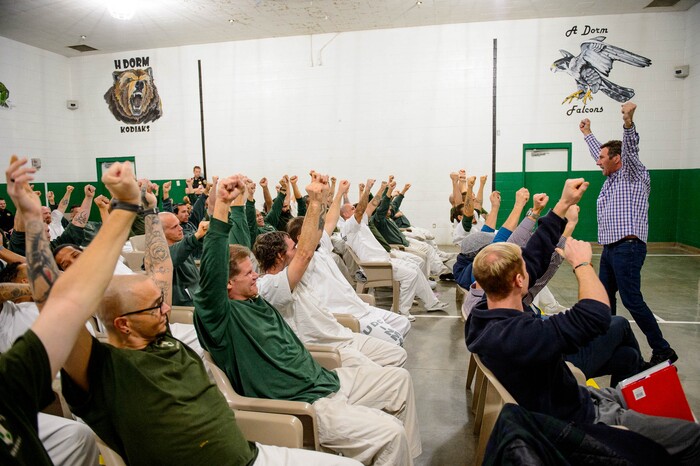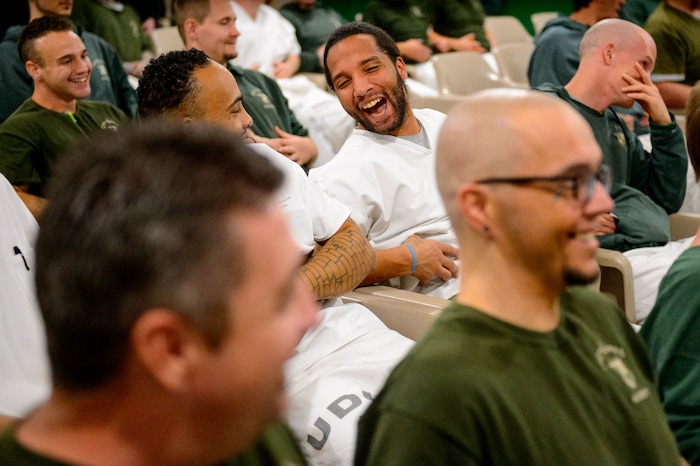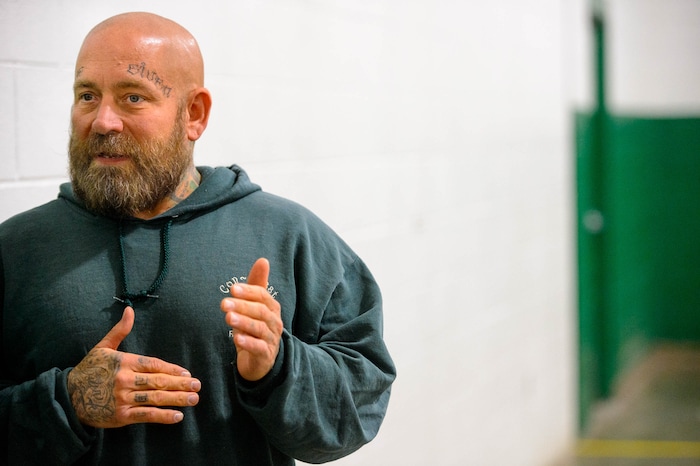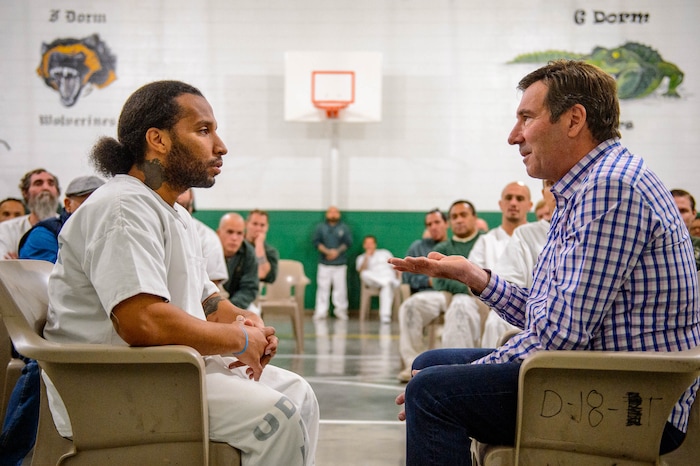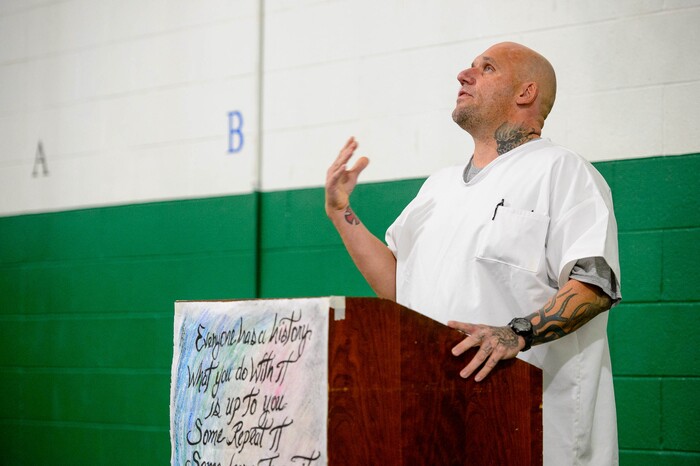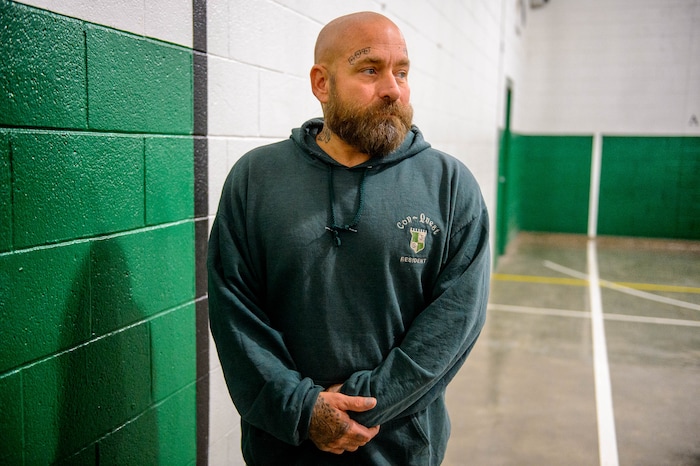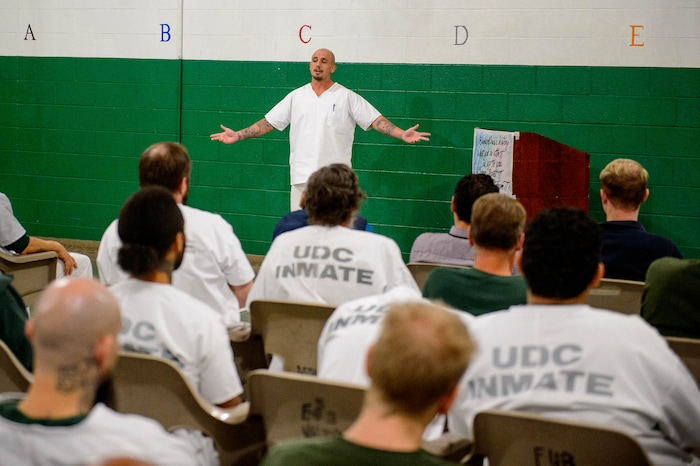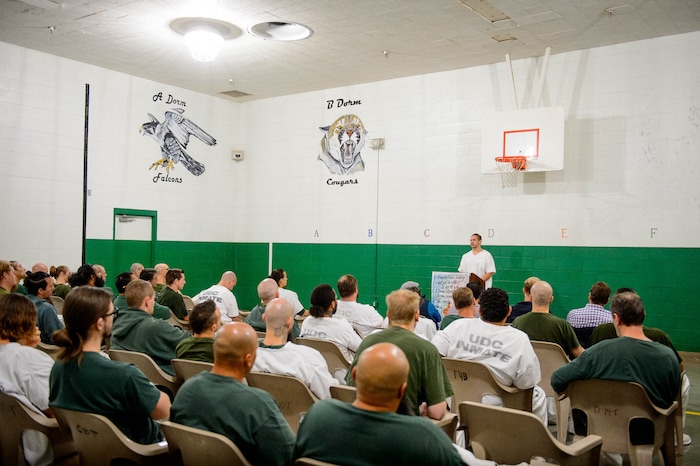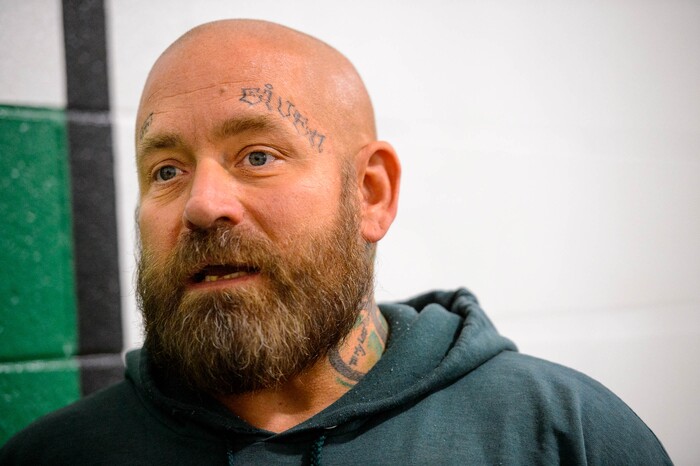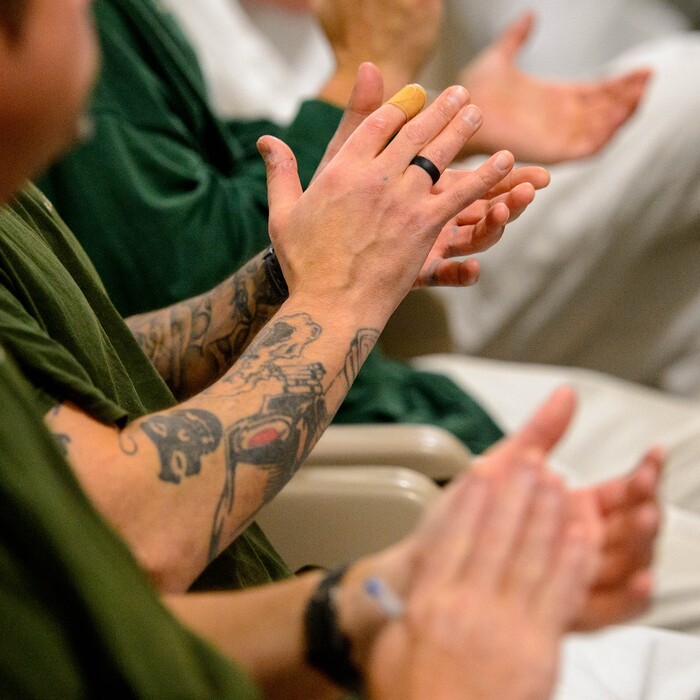Draper • After Jeff Zorad is paroled on Jan. 7, he wants to speak to Utah teenagers.
“Speaking with the high school kids,” he said, “is the most rewarding thing I’ve ever been able to do.”
Zorad was one of about 50 Utah State Prison inmates who attended a meeting Tuesday of the New Visions Speech Club. The club is part of the programming in the prison’s Promontory facility, which houses inmates who have demonstrated good behavior and want counseling and therapy. The club uses the same style as Toastmasters International, the public speaking club that teaches participants to express their points by telling a story.
And inmates have stories to tell.
(Trent Nelson | The Salt Lake Tribune) Jeff Zorad, an inmate at the Utah State Prison, at a meeting of the New Visions Speech Club in the prison's Promontory facility in Draper on Tuesday, Dec. 3, 2019.
When it was his turn to speak, Jeffery Boone Hunt, 23, from East Carbon, told how at age 4 he and his sister watched his father shoot his mother and then kill himself.
“The tragedy ruined our lives,” Hunt told fellow Promontory inmates. “It affected us in profound ways.”
Hunt’s mother survived. Her succession of boyfriends mistreated her, Hunt and his sister, he said. Hunt said those events led to the choices he made that sent him to prison. Utah court records show he has felony convictions for drug possession and causing damage to a jail.
“My advice to you,” Hunt said, “will be to limit interactions with bad people and stay away from nasty drugs.”
In most cases, Promontory inmates are nearing their parole hearings or have been issued parole dates. Hunt said he has a hearing scheduled for Dec. 17, when he will ask the Utah Board of Pardons and Parole to release him.
(Trent Nelson | The Salt Lake Tribune) Gage King, an inmate at the Utah State Prison, delivers a speech at a meeting of the New Visions Speech Club in the prison's Promontory facility in Draper on Tuesday, Dec. 3, 2019.
Gage King has felony convictions for robbery, assault and theft. He was once a peer leader in Promontory’s programming. On Tuesday, he told his fellow inmates how he received a demerit, got angry and asked to be removed from Promontory. He was transferred to a place with more dangerous offenders and began using methamphetamine and heroin there again.
King said he left prison three years later in a worse state than when he entered. When more offenses landed King back in prison, he said, he decided to work to get into Promontory.
“It’s been a program of growth this time,” King said.
Frank Lewis volunteers at the prison and helped bring the speech club to it. Lewis said he has participated in various Toastmasters chapters through the years. He knew a prison employee who oversaw programming and asked her about starting a Toastmasters-type program. The speech club came to the prison’s women's facility in September 2015, he said. A club for Promontory’s male prisoners started four months later.
The inmates not only speak to one another but also to community groups and high school students who visit the prison. Lewis said the program strives to help inmates in the same ways speech clubs help others: by teaching communication skills and confidence.
“When they’re preparing for a job interview or maybe talking to the parole board,” Lewis said, “they’ll have confidence. They’ll be articulate.”
(Trent Nelson | The Salt Lake Tribune) Frank Lewis, founder of the New Visions Speech Club, talks to an inmate at the Utah State Prison's Promontory facility in Draper on Tuesday, Dec. 3, 2019.
On Tuesday, Lewis recited a Jerry Seinfeld joke about how more people fear public speaking than death.
“This means to the average person, if you go to a funeral, you’re better off in the casket than doing the eulogy,” the joke goes.
Ben Barnett, 38, was president of New Visions until he was paroled last month. Barnett said that in prison he learned to tell his story of going from a returned missionary for The Church of Jesus Christ of Latter-day Saints and owning his own business to committing crimes such as robbery, assault and burglary.
“It can be a difficult conversation to have,” Barnett said, “but when I thought more about the kids that it might impact and contributing to a solution rather than a problem, it helps us find a purpose in there.”
After he left prison, Barnett said, he used those speech skills to perform better in a job interview and find employment as a marketing director.
No studies show whether speech clubs reduce recidivism, Lewis said, but he believes the prison is seeing positive results. There have been discussions, he said, of adding a club to other units.
(Trent Nelson | The Salt Lake Tribune) Inmates practice a belly laugh during a motivational talk by Bob Kittell at a meeting of the New Visions Speech Club at the Utah State Prison's Promontory facility in Draper on Tuesday, Dec. 3, 2019.
Zorad, 44, who is from Heber by way of Southern California, said he was bullied as a kid for being short and overweight. He said he has a teenage son who is bullied now because his father is in prison. Zorad has a 1-year-old son, too.
When paroled for his 2017 and 2018 forgery convictions, Zorad wants to use his new speaking skills to talk to kids about bullying. He also wants to tell children it’s OK to be afraid about the future as long as they find a positive way to work through the fear.
“I’m scared,” Zorad said of his pending release from prison. “If I wasn’t scared, I’d be a liar.”
